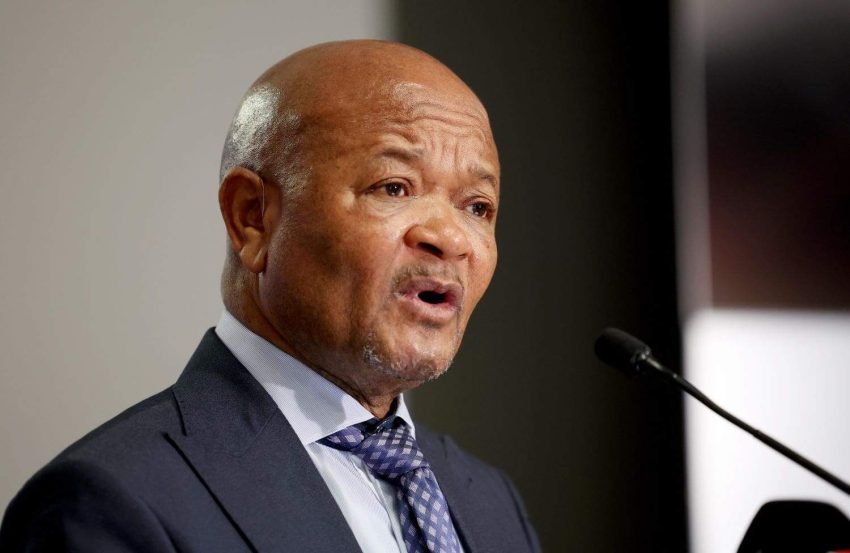Ramaphosa placed Mchunu on leave over the weekend, but parliament’s legal advisor said such a decision did not grant him immunity.
He may be placed on special leave, but Police Minister Senzo Mchunu must still answer to corruption allegations against him, argue parliament’s legal advisors and MPs.
On Wednesday, the portfolio committees on police, justice and constitutional development met to discuss their approach to explosive allegations made by Lt Gen Nhlanhla Mkhwanazi. The KwaZulu-Natal police commissioner alleged corruption, criminal collusion, cover-ups, and misconduct by police top brass, including Mchunu.
Speaker of parliament, Thoko Didiza, rejected a request for a parliamentary debate on the claims and instead requested that committees investigate them.
Mchunu ‘does not have legal immunity’
Ramaphosa placed Mchunu on leave over the weekend, but parliament’s legal advisor, Advocate Andile Tetyana, said such a decision did not grant Mchunu immunity.
“Minister Mchunu is not clothed with legal immunity by virtue of him being on special leave. We know for a fact now that he will be a material witness in the work of the commission, and should criminal conduct be found on his part, he will be charged and prosecuted,” he told parliament on Wednesday.
This was seconded by MK party MP Mzwanele Manyi.
“We must be clear that the fact that there is a judicial commission of inquiry does not insulate people from being arrested tomorrow. People are not on holiday now.
“The committee must make it clear that Mkhwanazi must arrest people tomorrow, or the next day. We must supervise what he is doing. He must give us regular reports so we can give him all the support he needs.”
Parliament’s options after Mkhwanazi allegations
They were speaking as the portfolio committees on police, justice and constitutional development met to discuss their approach to the allegations made by Mkhwanazi.
Tetyana said parliament has three options to deal with the claims made by the provincial commissioner.
He said the first option is appointing a judicial commission of inquiry, the second is establishing an ad hoc committee to investigate the claims, and the third is to have parliamentary committees work together to come up with their own findings.
“The committees of parliament in our view can deal with low-hanging fruit [issues],” Tetyana said while suggesting the interviewing of high-profile police officials implicated by Mkhwanazi.
A judicial commission of inquiry was formed by President Cyril Ramaphosa on Sunday. The commission will be led by Acting Deputy Chief Justice Mbuyiseli Madlanga and will provide preliminary reports at three and six months.
Scepticism about commissions and political will
Advocate Tetyana acknowledged that this committee may be met with mistrust because South Africans have lost faith in commissions of inquiry.
“I am not saying the commission is invalid, all I am saying is that there is scepticism about commissions of inquiry in general, and that is based on what people will say, that there have been commissions in the past and nothing has happened,” he said.
ALSO READ: DA brands Ramaphosa’s decision to suspend Mchunu an illusion of reform’
Tetyana said the problem with commissions is that if there is no political will to implement their findings, it may delegitimise the entire process.
“If there is no political will, then even the work of the commission will amount to nothing,” he said.
Manyi said he is concerned that the recommendations of this inquiry will not be implemented.
“The bottom line is that we have people that are dying every day, we are investing time and energy in an institution that cannot find a person guilty or innocent, that cannot ascribe liability. I am struggling to understand why we are doing this,” he said.
He said parliament should have strict oversight over the judicial inquiry.
“We are dealing with rogueness at all levels, so the role of parliament must be strong.”
Time frames
ActionSA parliamentary leader Athol Trollip said he is concerned about the lack of urgency in the commission of inquiry.
“There is a judicial commission of inquiry that is taking shape, it will take shape over the next six to 12 months, which is ridiculous.
“We cannot wait 12 months while people die on the streets and more people are helping themselves through nepotism and corruption in the police services,” he said.
Considering the arguments, there was an overwhelming view that an ad hoc committee should be established. However, the two committees will meet next week to chart a way forward.
NOW READ: DA reveals Mchunu is now under criminal investigation

